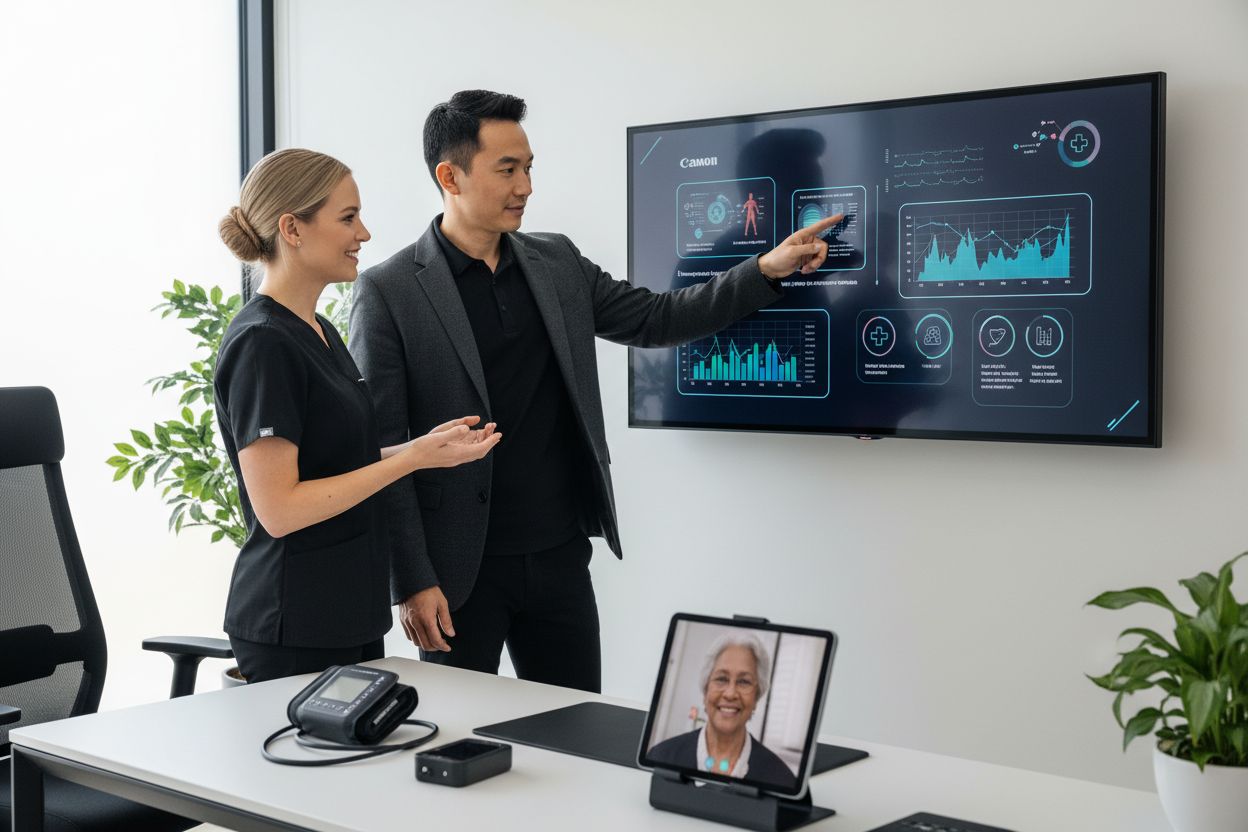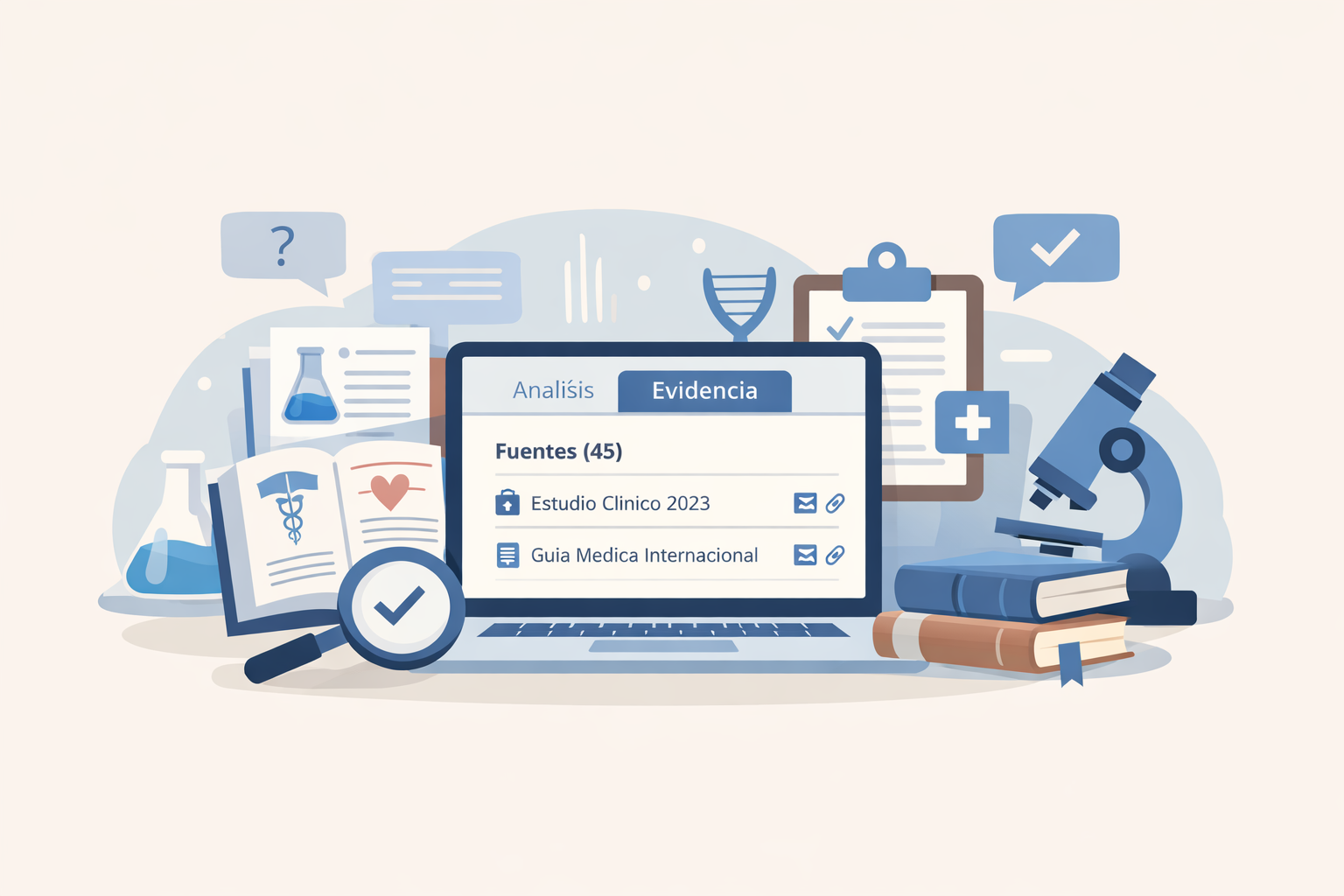Digital transformation is changing medicine at a speed never seen before and the use of digital tools in hospitals has grown exponentially in recent years.. Many believe that breakthroughs only come from the most expensive and complex medical technology. However, what is revolutionizing everyday practice is not just sophisticated equipment, but the way doctors and patients interact and manage information, taking medical care to entirely new levels of efficiency and personalization.
Table of Contents
- Introduction to digital tools in medicine
- Query management software to improve efficiency
- Telemedicine applications for remote care
- ia-assisted diagnostic tools
- Continuing education platforms for physicians
- Clinical data management and e-health tools
- Conclusions and future trends in digital tools
Quick Summary
| Conclusion | Explanation |
|---|---|
| Digital tools are essential in medicine | These tools help improve patient care and efficiency in medical processes. |
| Telemedicine expands access to health care | It allows medical consultations from any location, improving accessibility for all. |
| AI improves diagnostic accuracy | AI-based tools can detect diseases more accurately than experienced physicians. |
| Continuing education is vital for physicians | Digital platforms allow professionals to update their knowledge without interrupting their practice. |
| Digitizing processes optimizes time and reduces errors | Digital clinical data management reduces administrative errors and allows for patient-centeredness. |
1: Introduction to digital tools in medicine
The digital transformation in medicine has revolutionized the way healthcare professionals diagnose, treat and manage patient information. In an increasingly technological world, digital tools have become indispensable allies for physicians.
According to a study by McKinsey & CompanyThe adoption of digital technologies in medicine has grown exponentially in recent years, radically changing traditional medical practice. This evolution not only improves efficiency, but also allows for more personalized and precise care.
Digital tools for physicians in 2025 offer significant benefits:
- Optimization of diagnostic time
- Improved treatment accuracy
- Reduction of medical errors
- Facilitation of communication between professionals
In addition, the integration of artificial intelligence and machine learning is transforming medical practice. Physicians can now access detailed information, generate instant medical records and obtain treatment recommendations based on up-to-date scientific data.
Exploring our guide to artificial intelligence in medicineIn addition, you will gain a deeper understanding of how these technologies are redefining the future of healthcare.
The key is in the adaptation and continuous learning. Healthcare professionals who embrace these digital tools will not only improve their medical practice, but also provide more efficient, patient-centered care.
2: Query management software for improved efficiency
At present, efficient management of medical consultations is essential to optimize time and improve the quality of patient care. Practice management software has become an essential tool for healthcare professionals, enabling smarter and streamlined management of clinical processes.
According to a report by StatistaThe global market for electronic health record management systems will reach US$47 billion by 2025, demonstrating the growing importance of these technological solutions.
Modern practice management software offers multiple benefits:
- Automated appointment scheduling
- Digital medical records
- Instant generation of medical reports
- Reduction of administrative errors
Digitization of medical processes allows professionals to concentrate more on direct patient care, minimizing the time spent on administrative tasks. These systems integrate advanced functionalities such as follow-up reminders, record management and secure communication between professionals.
Discover our new features to optimize patient consultationsthat can significantly transform your medical practice.
Technology not only streamlines processes, but also ensures greater accuracy and security in the handling of sensitive information. The implementation of this software represents a strategic investment in the modernization and efficiency of any practice or medical center.
3: Telemedicine applications for remote care
Telemedicine has revolutionized medical practiceenabling remote consultations that overcome geographic barriers and improve access to healthcare services. In an increasingly connected world, these applications offer innovative solutions for healthcare.
According to the World Health Organization, telemedicine allows health professionals to diagnose, treat and prevent diseases using remote communication technologies. This modality has gained special relevance after the COVID-19 pandemic.
Telemedicine applications offer significant benefits:
- Medical consultations from any location
- Reduction of waiting times
- Increased accessibility for patients with limited mobility
- Continuous treatment follow-up
Today's technology allows consultations with a quality and security comparable to face-to-face consultations.. The most advanced platforms integrate high-definition videoconferencing systems, secure medical record sharing and remote diagnostic tools.
Explore our complete guide to medical resources to better understand how to implement these technologies in your practice.
Physicians who adopt these digital tools will not only increase their efficiency, but will also be able to provide more inclusive care tailored to the needs of patients in different geographic and social contexts.
4: AI-assisted diagnostic tools
Artificial intelligence is radically transforming the medical diagnostic process.The company offers tools that improve the accuracy and speed of identification of medical conditions. These technological solutions represent a revolution in modern clinical practice.
According to a study published by Nature MedicineAI systems can detect diseases with an accuracy comparable or even superior to that of experienced physicians in multiple specialties.
AI-assisted diagnostic tools have revolutionary features:
- Instant analysis of medical images
- Early identification of risk patterns
- Processing of large volumes of clinical data
- Significant reduction of error margins
AI technology does not seek to replace the medical professional, but rather to enhance his or her diagnostic capacity.. These tools can process complex medical information in seconds, providing recommendations based on millions of previously analyzed clinical cases.
The most advanced algorithms can analyze X-rays, MRIs and CT scans with astonishing accuracy, detecting anomalies that might go unnoticed by the human eye.
Explore our resources on artificial intelligence in medicine to understand the potential of these tools in depth.
The integration of these technologies not only improves diagnostic accuracy, but also allows for more personalized and preventive medicine, anticipating risks and offering more effective treatments.
5: Continuing education platforms for physicians
Continuing medical education is essential to keep up to date in a field as dynamic as medicine.. Modern digital platforms offer innovative solutions that transform the way healthcare professionals learn and update themselves.
According to a report by Journal of Medical Internet ResearchIn the wake of the global pandemic, online medical education platforms have experienced exponential growth, especially after the global pandemic.
The most outstanding features of these platforms include:
- Fully online certified courses
- Webinars with international experts
- Updates on recent medical research
- Personalized learning tracking systems
The flexibility to learn from anywhere is one of the greatest benefits of these digital tools.. Physicians can access specialized content without interrupting their daily clinical practice, optimizing their time and keeping their knowledge at the forefront.
The best platforms integrate technologies such as artificial intelligence to personalize learning content, offering recommendations based on each physician's professional profile and specific areas of interest.
Discover our subscription plans designed for your medical journeydesigned to facilitate your continuous professional development.
In a constantly evolving medical world, these platforms are not a luxury, but a necessity for professionals committed to excellence and continuous improvement of their professional skills.
6: Clinical data management and e-health tools
Digital transformation in clinical data management has revolutionized the way healthcare professionals manage medical information. E-health systems not only simplify administrative processes, but also significantly improve the quality of patient care.
According to a study published by JAMA Network, the implementation of electronic records systems has reduced medical errors by up to 30% in healthcare institutions.
The most advanced clinical data management tools offer:
- Secure and centralized storage of medical records
- Instant integration between different specialties
- Automatic generation of medical reports
- Data protection under international privacy standards
Today's technology enables smarter, more efficient medical information management. Modern systems use state-of-the-art encryption and security protocols to ensure the confidentiality of patient information.
Discover how you can automatically build your patient's medical recordoptimizing time and reducing the administrative burden.
Healthcare professionals who adopt these digital tools not only improve their efficiency, but also provide more personalized care based on accurate and up-to-date data.
7: Conclusions and future trends in digital tools
Digital medicine is undergoing an unprecedented transformationwhere technology becomes a fundamental ally for healthcare professionals. Digital tools are no longer an option, but a necessity to provide modern and efficient medical care.
According to Gartner Research, by 2026 more than 60% of medical institutions will implement artificial intelligence solutions in their clinical and administrative processes.
Key technology trends for physicians include:
- Integration of machine learning in diagnostics
- Personalization of treatments through data analysis
- Remote queries with augmented reality support
- Automation of administrative processes
Technological evolution does not seek to replace the medical professional, but rather to enhance his or her capabilities.. Combining human expertise with intelligent digital tools will enable more accurate, accessible and patient-centered medicine.
Professionals who adopt these technologies strategically will be able to:
- Reduce diagnostic times
- Improve treatment accuracy
- Optimize medical information management
- Offering a more personalized service
Digitalization in medicine is not a passing trend, it is a revolution that is completely redefining how we understand and practice healthcare.
Below is a summary table that synthesizes the main themes, benefits and key approaches covered in the article on digital tools for physicians in 2025.
| Topic/Tool | Main function | Benefits Highlights |
|---|---|---|
| Query management software | Digital management of appointments, files and processes | Optimizes time, reduces administrative errors, improves patient care |
| Telemedicine applications | Remote medical consultations through technology | Increased accessibility, reduced waiting times, continuous service |
| Artificial intelligence assisted diagnosis | Automatic analysis of images and clinical data | Advanced diagnostic accuracy, early disease detection, personalization |
| Continuing education platforms | Customized online medical courses and content | Constant updating, flexibility in learning, access to experts |
| Clinical data management and e-Health | Secure storage and handling of medical information | Centralization of data, reduction of medical errors, privacy protection, etc. |
| Future trends and conclusions | Integration of AI, machine learning, administrative automation | More accurate and efficient medicine, personalized care, process optimization |
Explore the innovations that will transform your medical practiceGet ready to be part of this technological revolution that promises to make medicine more humane and intelligent.
Make your medical practice more efficient today with the best digital tools
In the article you already knew about the challenges facing healthcare professionals in 2025: excessive administrative tasks, agile and accurate diagnosis, and the urgent need to adopt secure technological solutions. Itaca.ai brings together everything you need to overcome these obstacles in your day-to-day clinical practice. Discover immediate answers thanks to the automatic generation of SOAP notes, intelligent diagnostic support and the efficient management of your patients' information, always under the highest security standards. Take advantage of our technology to make your interaction with your patients more human and accurate, and your management much easier. Would you like to learn more? Find useful resources and practical tips in our physician guides section.
Start transforming your practice today with a platform built for your real needs. Don't get left behind in the medical digital revolution and explore all the possibilities that Itaca.ai offers for you in https://itaca.ai. Take the next step towards a more agile, efficient and safer medicine for you and your patients.
FAQ
What are digital tools for physicians in 2025?
Digital tools for physicians in 2025 are technologies and software that facilitate diagnosis, treatment and patient information management, such as telemedicine systems, practice management and AI-assisted diagnosis.
What are the benefits of using practice management software in the medical practice?
The use of practice management software allows for automated scheduling of appointments, reduction of administrative errors, and optimizes time to care, resulting in improved quality of patient care.
How does telemedicine improve access to care?
Telemedicine allows remote consultations, facilitating access to health services for patients in remote locations or with limited mobility, reducing waiting times and providing continuous care.
What role does artificial intelligence play in medical diagnostics?
Artificial intelligence improves the accuracy and speed of diagnosis, enabling physicians to analyze images and clinical data more easily, which helps in the early identification of diseases.





Leave a Reply